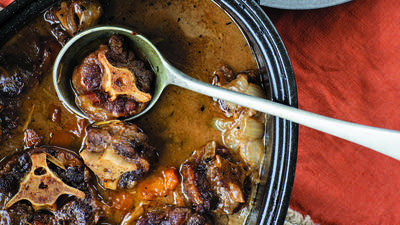
Everywhere I go, I meet people who see something broken in their local food system and decide to change it. For instance, many wannabe farmers are spending their savings on farms because they really believe in the local, sustainable, and organic movements. But many lose their shirts because beliefs don't pay the bills.
The Intervale Center set out to change that. Founded 25 years ago, Intervale is a school for potential farmers -- and far more. It's based within the city limits of Burlington, Vt., and Travis Marcotte is the center’s executive director.
Lynne Rossetto Kasper: You train farmers. How do you do this?
 Travis Marcotte
Travis Marcotte
Travis Marcotte: We actually do a little bit of farmer training and we do a lot of other things to strengthen our food system. We manage about 350 acres here in the city limits of Burlington, and we use that landscape as a farm-based incubator where beginning farmers can come and actually test out their business model here on our property.
LRK: So, they're actually going to be growing on those acres?
TM: They get access to equipment, from greenhouses to tractors. Most importantly, I think, they gain access to what we call mentor farmers -- farmers who have great experience and knowledge that they can share with beginning farmers. What we're looking for are folks who have some farm experience, have a business plan for their concept, and really have demonstrated a lot of passion and an understanding of how hard this undertaking is going to be.
Farmers can leave here much better prepared to go to the bank, borrow that money and own that farm.
LRK: What's the hardest thing to teach?
TM: I think it's like any business or career: You can't really teach the passion piece, and so you've really got to make sure this is what people want to do. If they decide that the realities of it are not what they dreamed it would be, it's a great way to take a different path in life and not feel like you've risked it all on buying a farm.
LRK: Does it happen fairly often that people say, "You know, I've just found out it's not for me"?
TM: Not so much in our program, because there's a lot of work that we do on the front end. But in farming, in general, there's some real business aspects that you need to be really engaged in; there's marketing that you have to do. I think some folks do approach farming with this passion for growing things, but you also need to have that skill set around marketing and business management.
LRK: What else do you do at Intervale?
TM: We manage the 350 acres, and we do that in service to the community, so you have a place that's available for people to recreate and engage in farming. From there, we've really built a set of programs that helps farmers get in business, so that's the incubator program. We do business planning statewide with all different kinds of farms; that's the stay-in-business kind of program.
For example, the von Trapp Farmstead in Waitsfield, Vt., came to us. They've been milking cows. Mom, dad, and the two sons wanted to come back to the farm. In order for that farm to sustain the two sons, mom and dad, they thought if they added value to the milk in the form of cheese, then they could build a business that would really be successful for all of them.
We helped them build a plan that allowed them to launch the von Trapp Farmstead cheese line. In 2007, we started some work with them, and now they're very successful making cheese. It's those kinds of examples of business planning that we do around the state of Vermont that really help people stay in business and thrive.
Before you go...
Each week, The Splendid Table brings you stories that expand your world view, inspire you to try something new and show how food brings us together. We rely on you to do this. And, when you donate, you'll become a member of The Splendid Table Co-op. It's a community of like-minded individuals who love good food, good conversation and kitchen companionship. Splendid Table Co-op members will get exclusive content each month and have special opportunities for connecting with The Splendid Table team.
Donate today for as little as $5.00 a month. Your gift only takes a few minutes and has a lasting impact on The Splendid Table and you'll be welcomed into The Splendid Table Co-op.




